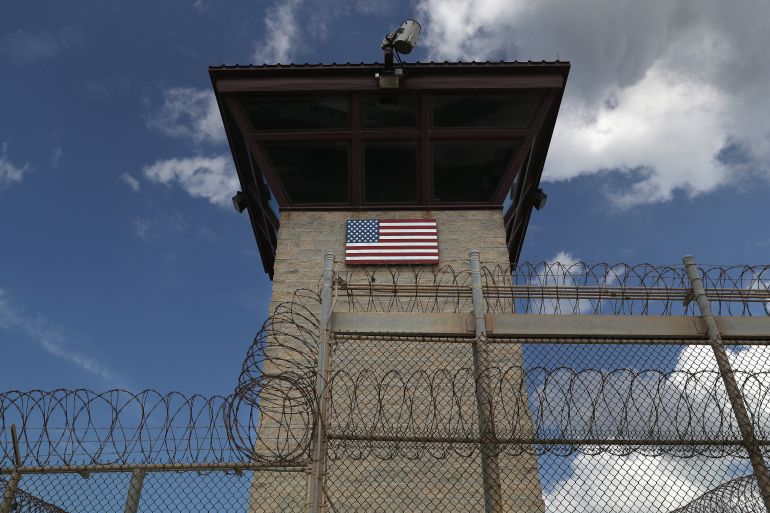Two Pakistanis leave Guantanamo after 20 years without charges
Abdul and Mohammed Rabbani, arrested from Karachi in 2002, are the latest inmates to be released from US custody.

Two Pakistani brothers held by the United States at Guantanamo Bay military prison for two decades have been freed by US officials and have returned home, officials said.
Abdul, 55, and Mohammed Rabbani, 53, will be reunited with their families after a formal questioning by Pakistani authorities, security officials and a Pakistani senator said on Friday.
Keep reading
list of 4 items‘Secrecy the priority’: Guantanamo battling COVID outbreak
Afghan held at Guantanamo Bay freed after 15 years without trial
Our ‘father’ has finally been released from Guantanamo
The two brothers arrived at an airport in the capital, Islamabad, on Friday. Pakistani Senator Mushtaq Ahmed Khan, the chairman of the human rights committee in the upper house of Pakistan’s parliament, tweeted that the two brothers had reached Islamabad airport.
Khan said the men were “innocently imprisoned in Guantanamo Bay for 21 years”.
“There was no trial, no court proceedings, no charges against them. Congratulations on their release. Thank you Senate of Pakistan,” he wrote on Twitter.
Khan later told The Associated Press that the brothers were being sent to Karachi, the capital of southern Sindh province, where they lived with their families. He said he hoped the men will be reunited with their families soon.
They were the latest inmates to be released from US custody as the country moves towards emptying and shutting down the prison.
The George W Bush administration set it up at a naval base in Cuba for suspects rounded up after the September 11, 2001 attacks on the US.
The releases come months after a 75-year-old Pakistani, Saifullah Paracha, was freed from the Guantanamo Bay prison.
The two brothers were originally transferred to US custody after Pakistani officials arrested them in their home city of Karachi in 2002. US officials accused the two of helping al-Qaeda members with housing and other lower-level logistical support.
The brothers alleged torture while in CIA custody before being transferred to Guantanamo. US military records describe the two as providing little intelligence of value or recanting statements made during interrogations on the grounds they were obtained by physical abuse.
The US military announced their repatriation in a statement. It gave no immediate information on any conditions set by Pakistan regarding their return there.
“The United States appreciates the willingness of the Government of Pakistan and other partners to support ongoing US efforts focused on responsibly reducing the detainee population and ultimately closing the Guantanamo Bay facility,” the defence department said.
On Friday, a close family friend of the two brothers told the AP that Pakistani authorities had formally informed the brothers’ family about the release and their return to Pakistan.
The family friend, who is Pakistani and refused to be identified for security reasons, said the younger Rabbani learned painting during his detention at Guantanamo Bay, and that he was expected to bring with him some of those paintings.
He said Ahmed Rabbani frequently went on hunger strikes and prison officials fed him through a tube. He said the man remained on the nutritional supplements.
Guantanamo at its peak in 2003 held about 600 people whom the US considered “terrorists”. Supporters of using the detention facility for such figures contend it prevented attacks.
But critics say the military detention and courts subverted human rights and constitutional rights, and undermined US standing abroad.
Thirty-two detainees remain at Guantanamo Bay, including 18 eligible for transfer if stable third-party countries can be found to take them, the Pentagon said.
Many are from Yemen, a country considered too plagued with war and armed groups, and too devoid of services for freed Yemeni prisoners to be sent there.
Nine of the inmates are defendants in slow-moving military-run tribunals. Two others have been convicted.